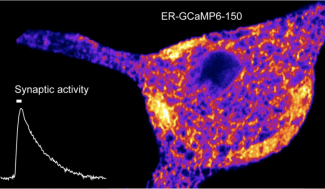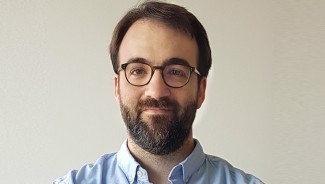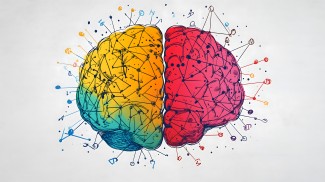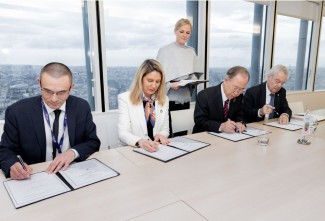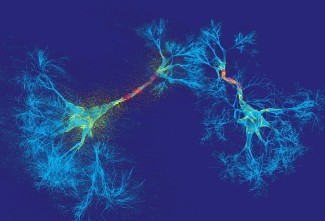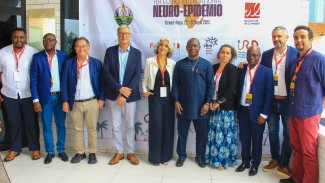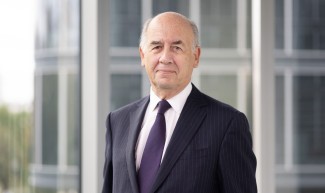Jaime de Juan-Sanz holds The Diane Barrière Chair « Molecular physiology of synaptic bioenergetics ». We met him in is new lab to talk about his background and research projects.
What is your background before coming to Paris Brain Institute?
I did my PhD in Spain, at the Center for Molecular Biology Severo Ochoa in Madrid. I studied glycine transporters, in particular GlyT2. Mutations in this transporter cause a disease called hyperekplexia, a neurological disorder characterized by pronounced startle responses to tactile or acoustic stimuli and hypertonia. In my PhD I worked on understanding the molecular mechanisms controlling this protein to provide more insights to understand this disease. Then I moved to the United States at the Weill Cornell Medical College in New York City to study the molecular mechanisms that control synaptic function in the lab of Timothy Ryan. There, we developed new biosensors to study novel biology of axonal organelles such as the endoplasmic reticulum and mitochondria. This was very useful to see things we could not see before, which allowed us to learn many new aspects of how synapses work.
When did you know you wanted to do neuroscience?
When I was studying at the University actually… to me it really was the most interesting issue. Neuroscience is a very complex piece of biology. I thought it was very interesting back in the day, but I still think the same today. Understanding how the brain works is a crazy task we are all trying to do together and it really is an exciting challenge.
What led you to Paris Brain Institute?
One thing I really like about Paris Brain Institute is that it is very focused on neuroscience. I really love having all my colleagues doing many very different things at all scales, from clinical trials to molecular biology, to circuits, diseases… I think it is a very good place for me to learn more about the many things in neuroscience that I am not an expert on, but also it will give me the opportunity to help others with my knowledge in molecular neurobiology, imaging and biosensors.
What will your research at Paris Brain Institute be about?
My research holds two different aspects: one more basic and one more related to pathology. The first one is to understand how neuronal communication is sustained by neuronal metabolism. The brain consumes a lot of our daily energy intake. Synapses in particular, which connect neurons to one another, are actually highly energy-consuming. Every time neurons communicate with each other a lot of energy is consumed during the process. Not surprisingly, not having enough energy to sustain neuronal communication leads to deleterious effects. The first aim of my research is to understand what are the essential molecular actors involved in sustaining bioenergetics in healthy synapses. The second aim, more related to pathology, is based on the hypothesis that impaired bioenergetics may cause epilepsy. 170 different mutations in humans that affect the function of mitochondria, the organelle that provides energy in the cells, cause epilepsy. My idea is to work on developing a better understanding at the molecular level of how things are failing in synapses from an energetic point of view when mitochondria are dysfunctional and see whether this is influencing the development of epilepsy.
What collaboration would like to set up here at Paris Brain Institute?
I will collaborate with Vincent Navarro and Stephanie Baulac on epilepsy for sure. We are currently discussing what we can do together. I am working mainly with rats and mice models but if we can get human samples from epileptic brains at some point, we could try to translate some of our work in humans. Also, I would like to collaborate with Nelson Rebola, we have common interests in understanding synaptic function. My idea is to move some of our novel tools into brain slices with Nelson to explore the synaptic role of organelles in intact tissue.
will give me the opportunity to help others with my knowledge in molecular neurobiology, imaging and biosensors.
What will your research at Paris Brain Institute be about?
My research holds two different aspects: one more basic and one more related to pathology. The first one is to understand how neuronal communication is sustained by neuronal metabolism. The brain consumes a lot of our daily energy intake. Synapses in particular, which connect neurons to one another, are actually highly energy-consuming. Every time neurons communicate with each other a lot of energy is consumed during the process. Not surprisingly, not having enough energy to sustain neuronal communication leads to deleterious effects. The first aim of my research is to understand what are the essential molecular actors involved in sustaining bioenergetics in healthy synapses. The second aim, more related to pathology, is based on the hypothesis that impaired bioenergetics may cause epilepsy. 170 different mutations in humans that affect the function of mitochondria, the organelle that provides energy in the cells, cause epilepsy. My idea is to work on developing a better understanding at the molecular level of how things are failing in synapses from an energetic point of view when mitochondria are dysfunctional and see whether this is influencing the development of epilepsy.
What collaboration would like to set up here at Paris Brain Institute?
I will collaborate with Vincent Navarro and Stephanie Baulac on epilepsy for sure. We are currently discussing what we can do together. I am working mainly with rats and mice models but if we can get human samples from epileptic brains at some point, we could try to translate some of our work in humans. Also, I would like to collaborate with Nelson Rebola, we have common interests in understanding synaptic function. My idea is to move some of our novel tools into brain slices with Nelson to explore the synaptic role of organelles in intact tissue.
What is your hope in research?
My hope is to understand much better the rules controlling how neurons communicate with each other. This will help the scientific community to better understand how the brain works but also to understand how synaptic dysfunction may contribute to different diseases of the nervous system. A detailed understanding of a disease is essential to find a cure.
